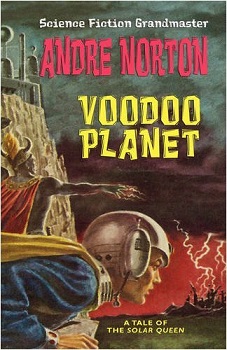
Voodoo Planet
Andre Norton
192 pages
published in 1956
Genre science fiction got its start in the pulp magazines of the twenties and thirties and many of its early writers were just pulp authors writing the same old stories they'd always written, just with some sf flavourings. So instead of the brave sheriff depending on his horse and trusty six gun to fight off the bandits out in the Oklahoma badlands, you got the brave space marshall depending on his trusty rocket and raygun to take out the bandits hiding out in the Martian badlands. It's this what fans meant when they talked about space opera, before that got co-opted for something more respectable, crappy fake science fiction stories that might just as well have been westerns. As the field matured and new writers moved in actually interested in science fiction as a genre, these stories quickly disappeared.
Even so, they never completely went away and every now and then you run across a story whose pulp roots are clearly visible, even with a writer like Andre Norton. Voodoo Planet, as you may have guessed, is one example. The sequel to Plague Ship, this is another adventure of the crew of the Solar Queen, who have been invited to a big game hunt in Africa Khatka, a planet settled by African colonists, where they run straight into a trap set by the resident witch doctor.
Which is just as pulpy as it sounds. Khatka is a planet that's like the Africa out of pulp magazines, mostly untamed wilderness full of dangerous animals, while the natives are somewhat more sophisticated than in the prewar pulps. Norton is at pains to emphasise that Khatka is just as civilised a planet as any other, they just prefer the primitive life of their terran ancestors. It's all a bit separate but equal, not very progressive even for the fifties.
The plot doesn't help, pitting the rational crew of the Solar Queen against one of the hoariest of pulp cliches, the evil medicine man who uses superstition to oppress the hapless natives. Even though the various black characters are just as well rounded as the Solar Queen's men, ie solidly twodimensional, that kind of plot still taps into all sorts of racist, colonial imagery. Again, Norton does seem to do her best to avoid this, but the shape of the story works against her. It remains too obviously an pulp African adventure transplanted to a science fiction setting. Not her best story.
Webpage created 08-12-2013, last updated 29-04-2014.